Airbus, a global leader in aerospace, is at the forefront of a revolutionary initiative: the ZEROe project.
This ambitious endeavor aims to bring the world’s first hydrogen-powered commercial aircraft to market by 2035. By leveraging cutting-edge technology and sustainable energy solutions, Airbus is paving the way for a greener and more sustainable future of aviation.
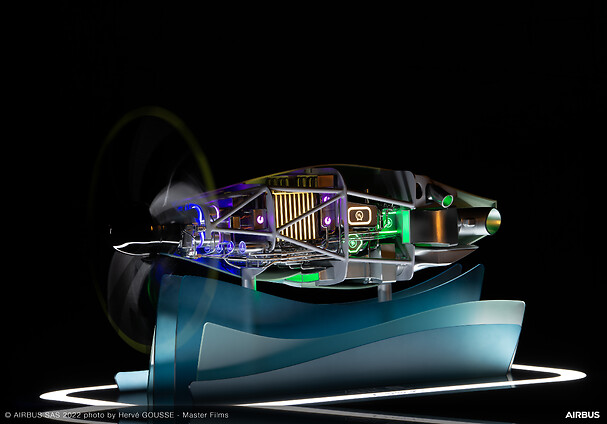
- The Conceptualization of Hydrogen- Powered Aircraft In 2020, Airbus unveiled four innovative aircraft concepts, each designed to be powered by hydrogen. These designs focus on two key propulsion methods: Hydrogen Combustion: A gas turbine engine, similar to current commercial aircraft engines, modified to burn hydrogen as fuel. This method uses hydrogen in a similar manner to today’s jet fuel.
- Hydrogen Fuel Cells: These fuel cells generate electricity to power electric motors that turn a propeller or fan. Unlike traditional jet engines, this system is fully electric and will be a departure from conventional aviation technology.
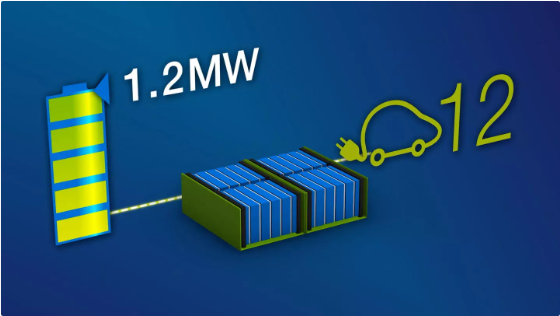
These two technologies are not mutually exclusive. Airbus is also exploring hybrid systems that combine both hydrogen combustion and fuel cells, allowing for a versatile and scalable approach to hydrogen-powered flight.
ZEROe Aircraft Concepts
Airbus has proposed four distinct designs for hydrogen-powered aircraft:
Turbofan Concept:
This features two hybrid-hydrogen turbofan engines and can carry up to 200 passengers with a range of over 2,000 nautical miles.
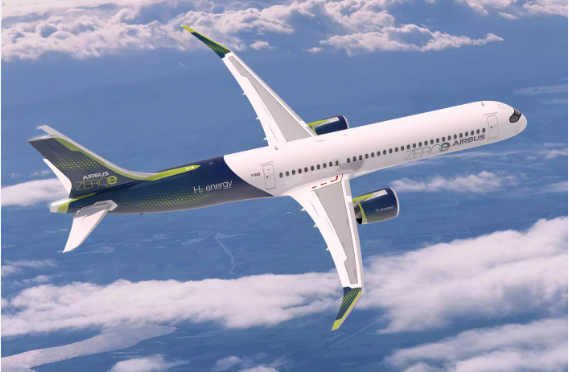
Turboprop Concept:
Equipped with two hybrid-hydrogen turboprop engines and a range of 1,000+ nautical miles, this design can carry fewer than 100 passengers.
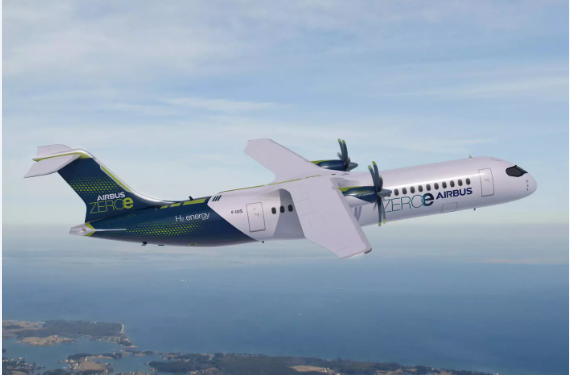
Blended-Wing Body (BWB) Concept:
Similar to the Urbofan, this design uses hybrid-hydrogen turbofan engines to achieve a range of 2,000+ nautical miles, with a capacity of up to 200 passengers.
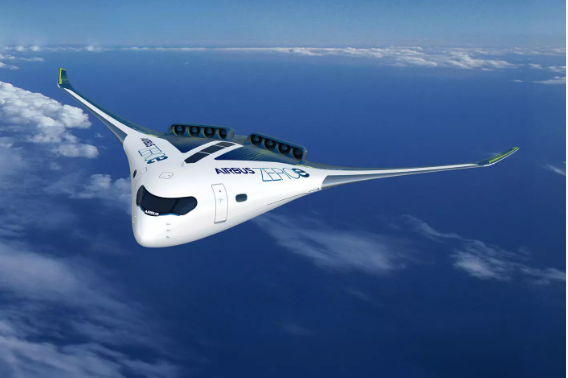
Fully Electric Concept:
This concept relies entirely on hydrogen fuel cells to generate electrical power, driving a propeller engine.

These varied designs offer flexibility in catering to different segments of the aviation market, from regional flights to longer international routes.
Technological Testing and Development
Airbus is well on its way to testing and refining the key technologies required for hydrogen-powered flight. Much of this progress revolves around propulsion systems, with major milestones being met each year:
Development of Hydrogen Fuel Cells:
Airbus has formed a joint venture, Aerostack, with automotive supplier ElringKlinger to develop hydrogen fuel cell stacks for aircraft propulsion. In 2023, Airbus successfully powered a future hydrogen-propulsion system, a significant step toward fully electric flight.
Fuel Cell Engine Testing:
The fuel cell engine is undergoing rigorous testing. In June 2023, Airbus achieved a major milestone by testing a 1.2-megawatt fuel cell system, the most powerful test ever conducted for aviation. This test demonstrated the potential of hydrogen fuel cells to power a large-scale aircraft.
In addition, Airbus has been modifying its A380 MSN1 aircraft to serve as a testbed for these technologies, and ground tests of the hydrogen fuel systems are expected to continue through 2024, with flight tests starting as early as 2026.
Designing and Manufacturing Hydrogen Storage Tanks
Storing hydrogen on board an aircraft is one of the most challenging aspects of this project. Hydrogen must be stored at a cryogenic temperature of -253°C, requiring highly specialized and insulated storage tanks.
To address this, Airbus established two Zero Emission Development Centres (ZEDCs) in Nantes, France, and Bremen, Germany. The teams at these centres are tasked with designing and testing hydrogen storage tanks, with the goal of integrating these tanks into the A380 demonstrator by 2026-2028.
The process begins with designing the tanks on software, followed by prototyping and testing. Once the first prototypes are complete, they will undergo rigorous testing with nitrogen before being filled with hydrogen. Feedback from these tests will drive the design of more efficient and effective tanks.
Building the Hydrogen Infrastructure
A successful hydrogen-powered aviation ecosystem requires significant infrastructure development, particularly at airports. Airbus is not only focusing on aircraft design but is also partnering with stakeholders to ensure the availability of hydrogen production, transportation, and storage facilities.
- Hydrogen Production: Airbus supports the production of green hydrogen—created through water electrolysis powered by renewable energy. This is the most sustainable method of producing hydrogen, essential to achieving zero emissions in aviation.
- Hydrogen Storage and Transportation: Once produced, hydrogen needs to be transported to airports in liquid form, requiring specialized tanks and infrastructure. For high-demand airports, Airbus is considering using existing pipelines or building new hydrogen networks to transport the fuel.
- Collaborative Efforts: Airbus is working closely with airports, energy providers, airlines, and other partners to build a global network of hydrogen hubs. These hubs will provide the necessary infrastructure to support hydrogen-powered aircraft, ensuring a smooth transition from current aviation fuel systems to hydrogen.

A Vision for the Future
While many challenges remain, the growing network of partners and the advancements made so far show that the goal of hydrogen-powered aviation is achievable. Airbus’ collaborations with over 200 airports, energy companies, and airlines are laying the foundation for a global hydrogen ecosystem that will be critical to supporting the introduction of ZEROe aircraft in 2035.
In addition, Airbus is actively addressing the economic and logistical challenges of hydrogen production and transportation. The company’s studies show that with strong support and incentives, hydrogen can become an economically viable solution for aviation.
Conclusion
The path toward hydrogen-powered flight is complex, requiring advancements in aircraft design, propulsion technologies, and infrastructure. But with each technological breakthrough, Airbus is getting closer to achieving its goal of zero-emission flight by 2035. The development of hydrogen combustion engines, fuel cell technology, cryogenic storage systems, and the creation of a global hydrogen infrastructure are all key steps in Airbus’ ambitious project. As the aviation industry takes these crucial steps, the future of sustainable, zero-emission air travel is becoming more and more within reach.
The collaboration among manufacturers, governments, and airlines will be essential in ensuring that hydrogen-powered aircraft are not just a futuristic dream, but a sustainable reality.
TAGS
Airbus #ZEROe #HydrogenAviation #SustainableAviation #GreenTechnology #ClimateAction #RenewableEnergy #FutureOfAviation #ZeroEmission #AerospaceEngineering

[…] MUST READ : Airbus Zeroe Aircraft […]